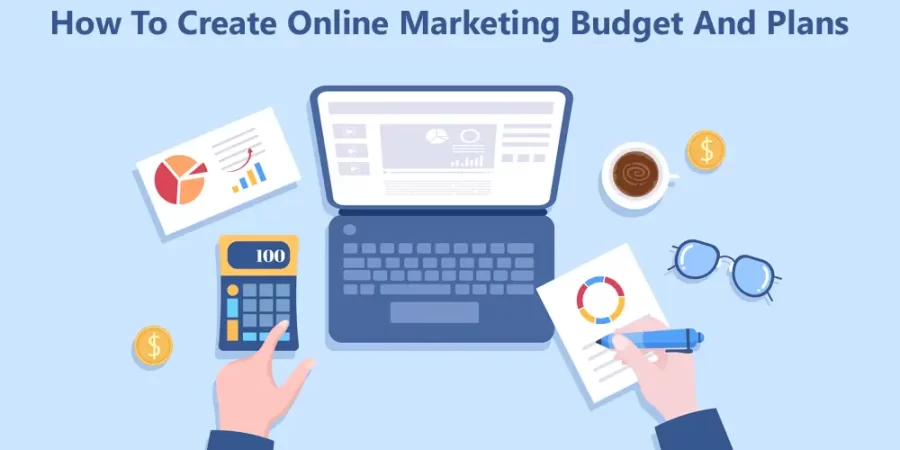Beginners Guide: How To Create Online Marketing Budget And Plans
Creating an online marketing budget and plan is an essential part of any business strategy. The process can seem daunting, but with the right approach, it can be broken down into manageable steps. This article will provide an overview of the key considerations and steps involved in creating an effective online marketing budget and plan.
- Define your goals and objectives
The first step in creating an online marketing budget and plan is to define your goals and objectives. These should be specific, measurable, attainable, relevant, and time-bound (SMART) goals. For example, if your goal is to increase website traffic, your objective might be to increase website traffic by 20% over the next six months.
- Conduct a marketing audit
Once you have defined your goals and objectives, the next step is to conduct a marketing audit. A marketing audit is a comprehensive review of your current marketing efforts, including an analysis of your strengths, weaknesses, opportunities, and threats. This will help you to identify areas where you can improve your online marketing efforts and to prioritize your budget and resources.
- Identify your target audience
Another key step in creating an online marketing budget and plan is to identify your target audience. Understanding your target audience will help you to develop a marketing strategy that is tailored to their needs and interests. This will enable you to create effective campaigns and to reach the right people with your marketing message.
- Develop your marketing strategy
Once you have conducted a marketing audit, identified your target audience, and defined your goals and objectives, the next step is to develop your marketing strategy. Your marketing strategy should include a mix of tactics, including search engine optimization (SEO), pay-per-click (PPC) advertising, social media marketing, content marketing, and email marketing.
- Create a budget
The next step in creating an online marketing budget and plan is to create a budget. Your budget should be based on your marketing strategy and should be allocated to the tactics and channels that will help you to achieve your goals and objectives. Be sure to include a contingency budget for unexpected expenses.
- Measure and analyze
Once your online marketing budget and plan are in place, it is important to measure and analyze your progress. This will help you to identify areas that are working well and areas that need improvement. Use tools like Google Analytics to track website traffic, conversions, and other key performance indicators (KPIs) that will help you to measure the success of your online marketing efforts.
- Optimize and refine
Based on the analysis of your progress, it’s crucial to optimize and refine your online marketing budget and plan. This will help you to improve your results and to make the most of your budget and resources.
Creating an online marketing budget and plan can seem like a daunting task, but with the right approach, it can be broken down into manageable steps. By defining your goals and objectives, conducting a marketing audit, identifying your target audience, developing your marketing strategy, creating a budget, measuring and analyzing your progress, and optimizing and refining your plan, you can develop an effective online marketing budget and plan that will help your business to succeed.
- Prioritize your tactics
When developing your online marketing budget and plan, it’s important to prioritize your tactics based on their potential impact and return on investment (ROI). This will help you to make the most of your budget and resources. For example, if your goal is to increase website traffic, your top priority should be tactics such as SEO and PPC advertising that drive traffic to your website.
- Consider using multiple channels
In today’s digital landscape, it’s important to use multiple channels to reach your target audience. This includes leveraging social media platforms, email marketing, content marketing, and other channels. This will help you to reach a wider audience and to create a more comprehensive online marketing strategy.
- Use data to make informed decisions
Data is an essential tool for creating an effective online marketing budget and plan. By using data to track the performance of your online marketing efforts, you can make informed decisions about where to allocate your budget and resources. This includes using tools like Google Analytics to track website traffic, conversions, and other key performance indicators (KPIs).
- Review and adjust your budget and plan
Creating an online marketing budget and plan is not a one-time task, it’s important to review and adjust your budget and plan regularly. This will help you to stay on track and to make adjustments as needed to achieve your goals and objectives. Be sure to review your progress regularly and make adjustments as necessary.
- Seek expert help
Creating an online marketing budget and plan can be a complex task, and it may be helpful to seek expert help. This can include hiring a digital marketing agency or consulting with a marketing expert to help you develop and implement your online marketing strategy.
Here are some detailed bullet points that summarize the key points discussed in the article about how to create online marketing budget and plans:
- Define your goals and objectives: The first step in creating an online marketing budget and plan is to define specific, measurable, attainable, relevant, and time-bound (SMART) goals for your business. These goals will serve as the foundation for your online marketing efforts.
- Conduct a marketing audit: Once you have defined your goals and objectives, the next step is to conduct a comprehensive review of your current marketing efforts, including an analysis of your strengths, weaknesses, opportunities, and threats. This will help you to identify areas where you can improve your online marketing efforts and to prioritize your budget and resources.
- Identify your target audience: Understanding your target audience is crucial for developing an effective online marketing strategy. By identifying your target audience, you can tailor your marketing messages to their needs and interests, and reach the right people with your marketing efforts.
- Develop your marketing strategy: Your marketing strategy should include a mix of tactics, including search engine optimization (SEO), pay-per-click (PPC) advertising, social media marketing, content marketing, and email marketing. This will help you to achieve your goals and objectives by reaching your target audience through multiple channels.
- Create a budget: Your budget should be based on your marketing strategy and should be allocated to the tactics and channels that will help you to achieve your goals and objectives. Be sure to include a contingency budget for unexpected expenses.
- Measure and analyze: Once your online marketing budget and plan are in place, it is important to measure and analyze your progress. This will help you to identify areas that are working well and areas that need improvement, using tools like Google Analytics to track website traffic, conversions, and other key performance indicators (KPIs).
- Optimize and refine: Based on the analysis of your progress, it’s crucial to optimize and refine your online marketing budget and plan. This will help you to improve your results and to make the most of your budget and resources.
- Prioritize your tactics: When developing your online marketing budget and plan, it’s important to prioritize your tactics based on their potential impact and return on investment (ROI). This will help you to make the most of your budget and resources.
- Consider using multiple channels: In today’s digital landscape, it’s important to use multiple channels to reach your target audience. This includes leveraging social media platforms, email marketing, content marketing, and other channels.
- Use data to make informed decisions: Data is an essential tool for creating an effective online marketing budget and plan. By using data to track the performance of your online marketing efforts, you can make informed decisions about where to allocate your budget and resources.
- Review and adjust your budget and plan: Creating an online marketing budget and plan is not a one-time task, it’s important to review and adjust your budget and plan regularly. This will help you to stay on track and to make adjustments as needed to achieve your goals and objectives.
- Seek expert help: Creating an online marketing budget and plan can be a complex task, and it may be helpful to seek expert help. This can include hiring a digital marketing agency or consulting with a marketing expert to help you develop and implement your online marketing strategy.
In conclusion, creating an online marketing budget and plan is an essential step for any business that wants to succeed in today’s digital landscape. By following the steps outlined in this article, you can develop an effective online marketing budget and plan that will help you to achieve your goals and objectives.
Remember that creating an online marketing budget and plan is a continuous process, so it’s important to review and adjust your budget and plan regularly, stay on top of industry changes, and optimize your strategies to get the best results. Additionally, seeking expert help can be extremely beneficial in creating a comprehensive online marketing strategy. With a solid online marketing budget and plan in place, you can take your business to the next level and reach new heights of success.





Leave a Reply